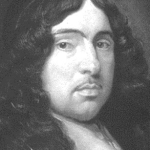DORINDA
And shut up our divided lids,
Tell me, Thyrsis, prithee do,
Whither thou and I must go.
THYRSIS
To the Elysium.
DORINDA
Oh, where is’t?
THYRSIS
A chaste soul can never miss’t.
DORINDA
I know no way but to our home,
Is our cell Elysium?
THYRSIS
Turn thine eye to yonder sky,
There the milky way doth lie;
’Tis a sure but rugged way,
That leads to everlasting day.
DORINDA
There birds may nest, but how can I
That have no wings and cannot fly?
THYRSIS
Do not sigh, fair nymph, for fire
Hath no wings yet doth aspire
Till it hit against the Pole:
Heaven’s the centre of the soul.
DORINDA
But in Elysium how do they
Pass eternity away?
THYRSIS
There’s no wolf, no fox, no bear.
No need of dog to fetch our stray,
Our Lightfoot we may give away;
No oat-pipe’s needful; there thy ears
DORINDA
Oh sweet! Oh sweet! How I my future state
By silent thinking antedate:
I prithee let us spend our time to come
In talking of Elysium.
THYRSIS
Then I’ll go on. There sheep are full
Of sweetest grass and softest wool;
There birds sing consorts, garlands grow,
Cool winds do whisper, springs do flow.
There always is a rising sun,
And day is ever but begun.
Shepherds there bear equal sway,
And every nymph’s a Queen of May.
DORINDA
Ah me, ah me!
THYRSIS
Dorinda, why dost cry?
DORINDA
I’m sick, I’m sick, and fain would die.
Convince me now that this is true
By bidding with me all adieu.
THYRSIS
I cannot live without thee, I,
I’ll for thee, much more with thee, die.
CHORUS
Then let us give Corillo charge o’ the sheep,
And thou and I’ll pick poppies, and them steep
In wine, and drink on’t even till we weep,
So shall we smoothly pass away in sleep.


















Comment form: